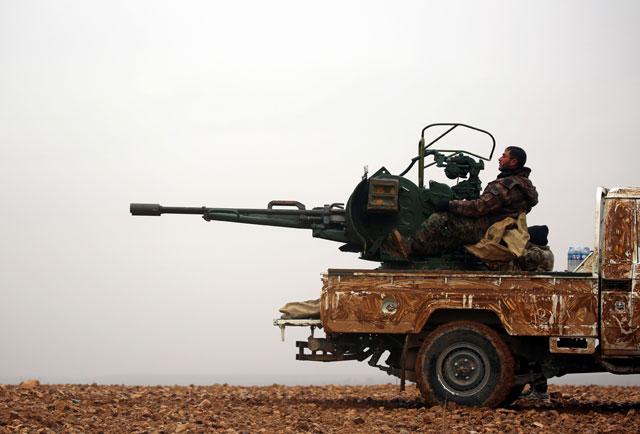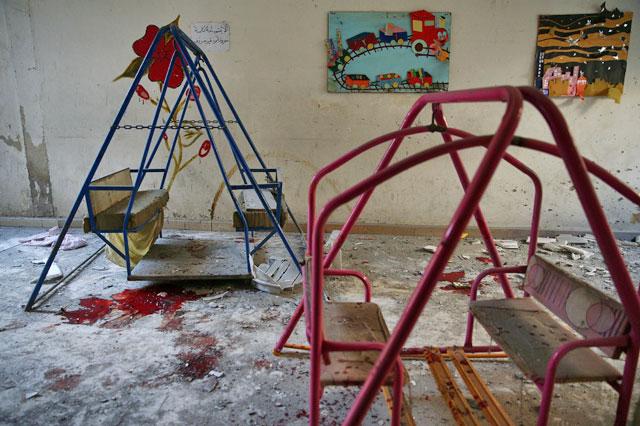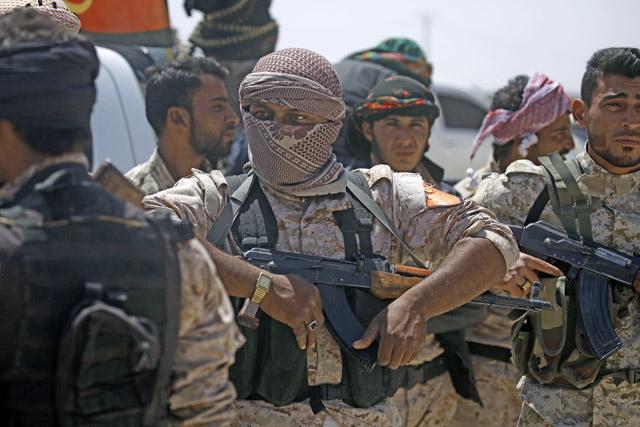You are here
In first, US gives anti-Daesh Syria force armoured SUVs
By AFP - Feb 01,2017 - Last updated at Feb 01,2017

This file photo taken on December 13, 2016 shows fighters from the Kurdish-Arab alliance known as the Syrian Democratic Forces sitting on a heavily armed vehicle near the village of Khirbet Al Jahshe, some 35 kilometres from Al Tabaqah on the western outskirts of Raqqa as they advance towards the Daesh group bastion (AFP photo)
HASAKEH, Syria — The United States has provided Syrian fighters battling the Daesh terror group with armoured vehicles for the first time, a US official and a spokesman for the anti-extremist force said Tuesday.
The delivery appears to be the first under President Donald Trump's administration, though the original decision pre-dates his January 20 inauguration, and comes after he gave the US military 30 days to deliver a plan to "defeat" Daesh.
Washington has long partnered with the Kurdish-Arab Syrian Democratic Forces alliance to battle Daesh in Syria, which has been ravaged by conflict since an anti-government uprising that began in March 2011.
But SDF spokesman Talal Sello said Trump’s administration had now promised “extra support”.
US military spokesman Colonel John Dorrian said the armoured Sports Utility Vehicles had been provided to the “Syrian Arab Coalition”, a grouping of Arab factions within the SDF.
He told AFP the decision was made “using existing authorities, in the interest of helping protect our partnered force from the [Daesh] improvised-explosive device threat”.
“The decision was made by military commanders, and has been in the works for some time,” he added.
The SDF has been a key partner for the United States in the fight against Daesh in Syria, with Washington supplying light weapons and special forces military advisers during former president Barack Obama’s administration.
The US-led coalition fighting Daesh in Syria and Iraq has also carried out air strikes in support of the SDF as it battles Daesh.
‘A new phase’
Pentagon spokesman Eric Pahon said the decision to supply the vehicles pre-dated the Trump administration, but on the ground it was being interpreted as a sign of new support.
“Before we used to receive light weapons, ammunition... with these armoured vehicles we’ve entered a new phase in the [US] support. It’s a sign,” Sello added.
“We have had meetings with representatives of the new administration, and they promised us extra support.”
The US alliance with the SDF has caused tensions between the United States and Turkey.
Of the roughly 30,000 fighters within the coalition, around two-thirds belong to the Kurdish People’s Protection Units (YPG), which Turkey considers a “terrorist” group.
Washington insists it only delivers military aid to the Arab component of the SDF, but the assistance has angered Ankara nonetheless.
Pahon said the decision to supply the vehicles “was a ground-level tactical decision... based on the threats the SDF might be facing”.
“We are providing them with the tools to face whatever the current threat is.”
The SDF has been battling since November 5 to oust the extremists from the city of Raqqa, the group’s de facto capital in Syria.
They are currently 20 kilometres north of the city, but have come under frequent attack by Daesh suicide car bombers, a favoured tactic of the extremist group.
UN-led peace talks delayed
The SDF was formed in October 2015, after the YPG Kurdish militia had already scored a string of victories against Daesh in northern Syria with air support from the US-led coalition.
Trump has said his focus in Syria will be battling Daesh, and on Saturday he signed an executive order giving the US military 30 days to devise a plan to “defeat” the extremist group.
The order, which called for a “comprehensive strategy and plans for the defeat of ISIS [Daesh]”, was seen as meaning more US forces and military hardware moving into Iraq and Syria.
Trump also chose to retain his predecessor’s special envoy to the coalition fighting Daesh, Brett McGurk, one of relatively few Obama-era officials to stay on into the new administration.
More than 310,000 people have been killed in Syria since the conflict began, and successive rounds of international efforts to find a political solution to the war have failed.
On Tuesday, the UN’s special envoy on Syria, Staffan de Mistura, said a new round of UN-led peace talks originally scheduled for February 8 had been postponed to February 20.
Speaking at a closed door meeting, he said the delay would give the Syrian opposition more time to prepare and ensure the talks are as inclusive as possible, two diplomats told AFP.
The delay comes after a round of peace talks in Kazakh capital Astana, sponsored by Syrian government allies Russia and Iran and rebel backer Turkey, ended with no major progress.
Trump’s administration was invited to participate in the talks but did not send a delegation.
Related Articles
AIN ISSA, Syria — US-backed Kurdish-Arab forces launched an offensive Sunday on the Daesh terror group's de facto Syrian capital Raqqa, uppi
TABAQA Dam, Syria — US-backed forces battled the Daesh terror group around a key Syrian town Monday, after the capture of an airbase brought
HAZIMA, Syria — US-backed fighters broke into the city of Raqqa on Tuesday as they launched a final assault to drive the Daesh group from it
















